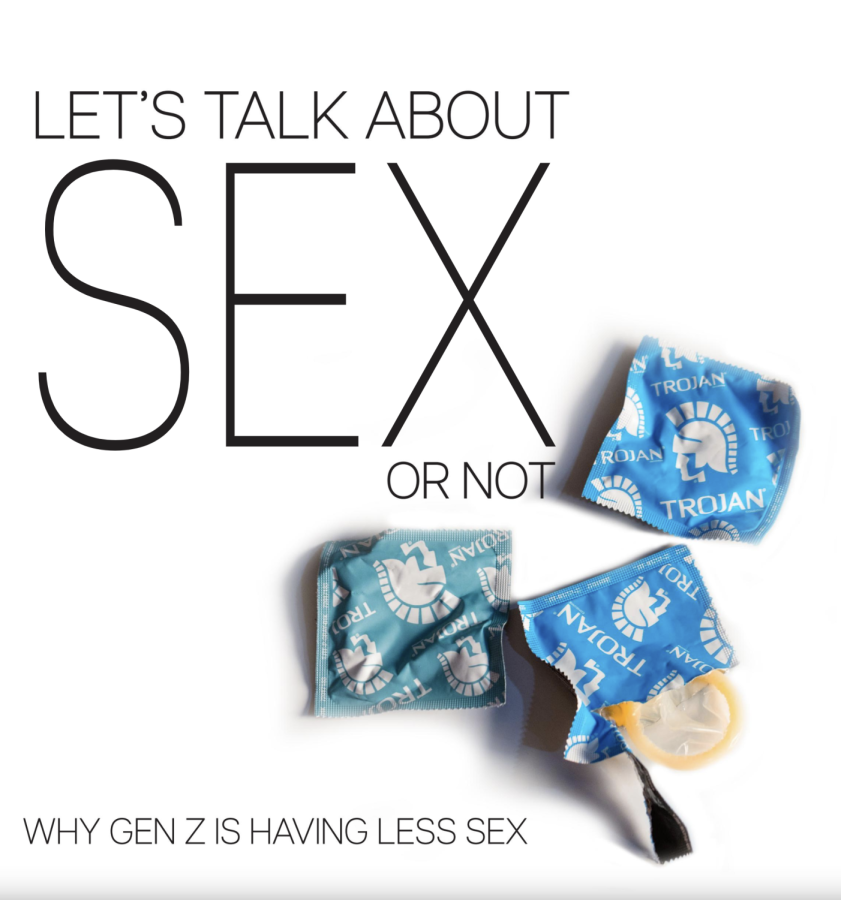‘This is definitely changing sex’: Why is Gen Z having less sex than other generations?
March 28, 2023
With the ability to swipe right looking for a hookup at any time, Gen Z is surprisingly having less sex than older generations.
Miles Morton, a senior studying political science and international relations at WKU, is choosing to not swipe at all. Morton is one of this growing number of college students who is not participating in dating or hookup culture. To Morton, sex is something he would only experience after being in a long-term relationship.
“I think on a personal level, it’s just not something that I’ve gotten extremely far out of my way to like to try and do,” Morton said. “I don’t think I’d have very much fun with it. And I’m not asexual, but on that spectrum, I’m somewhat close. I also think that in terms of like sex itself, it’s something that would come as a more long-term committed relationship that I just don’t really pursue.”
Morton’s indifference to sex is not uncommon among his peers in Gen Z – meaning anyone born between 1997-2012– who are having sex less often and with fewer partners than previous generations.
From 1991 to 2017, the Centers for Disease Control and Prevention’s Youth Risk Behavior Survey finds, the percentage of high-school students who’d had intercourse dropped from 54 to 40 percent.
Robin Marty, author of “A Handbook for Post-Roe America,” said Gen Z is less interested in sex than previous generations for a variety of reasons.
Marty suggests that with having a generation that is exposed more to sex, the interest in doing it as a rebellion or to prove independence isn’t compelling like to other generations.
“As we have this is a generation that has really devalued and taken away the emphasis on sex because that doesn’t prove anything,” Marty said. “In the same way that it used sex as a way of showing independence because your parents don’t want you to do it. It was a way of showing adulthood because you’re doing a very adult activity.”
With the rise of internet porn, OnlyFans, an Internet subscription site commonly used by sex workers, and sex consistently portrayed in the media, it could be that sex is less interesting than it was to less-exposed generations.
“For Gen Z, these are all things that really don’t resonate with them anymore because they’ve been inundated with sex from the moment that they started looking at YouTube videos when they were six and getting onto Tik Tok like all they have sex coming at them from everywhere,” Marty said. “It almost is some sort of a desensitizing thing where it no longer holds any sort of mystery.”
Experts agree that parents’ involvement in their child’s lives and after school activities has affected their sex lives.
“They don’t have the alone time in the ways that Gen X,” Marty said.”There’s always a parent home […] basically there’s no ability to sneak out or sneak around.”
Young people spend more time and energy on school and pursuing careers, which might be a factor. Spending more time single is typically associated with lower rates of sex.
Much like the rest of Gen Z, Morton is stressed from work, school and extracurricular activities such as competing nationally on the WKU’s forensics team.

“I’ve got a job,” Morton said. “And then if I’m not at my job, I’m competing on the speech and debate team. That alone takes up almost every weekend I have, and then during the week, there’s school.”
Morton, who is from Los Angeles, loves to travel and fears that a relationship would get in the way.
“Quite frankly, I think I would be really, really bad at committing to something long-term just because of the spontaneity with which I go through my life,” Morton said. “I’m very rarely in like, I don’t know, the same state for longer than like two months.”
For Morton, finding someone who is as interested in travel as he is would be like finding a “unicorn person.”
Despite the time and commitment challenges, Morton has tried out dating apps such as Tinder.
“They [dating apps] largely lack a sort of authenticity that I’d love to see in a relationship,” Morton said. “I think that the best connections I’ve ever made were really, really organic. They were people that I bumped into one day. And started the conversation with, found similar interests with sort of happenstance type things. Dating apps rob you of the fact that it feels really artificial. And not necessarily organic or natural in a way that I find appealing when it comes to meeting new people.”
As a result of this seemingly constant exposure, Gen Z is just less interested in sex.
“If your child is caught smoking a cigarette, you make them smoke the entire pack, and then they’re like, ‘Oh, I never want this again,’” Marty said. “I feel like that’s what our culture has done with sexuality, as essentially they push so much on them so young and so fast.”
‘Love who they want’
Gen Z is also the first generation to grow up in a more accepting society resulting in a higher number of people who are open about their sexuality. A record 7.1% of Americans self-identify as lesbian, gay, bisexual, transgender or something other than straight, according to a Gallup poll, and this number is likely to grow as the rest of Gen Z enters adulthood.
This number increased from 5.6% in 2020 to 7.1% in 2021, which also represented the largest increase in a single year, according to Gallup.
“I find it really fascinating that the lack of interest in sex and sexual activities seem to be very much corresponded with both the understanding that there is the ability to discover what your sexual orientation is very young, and also what your actual gender is very young,” Marty said.
Lauren McClain, a WKU sociology associate professor, finds that Gen Z is typically more open than previous generations.
“It contributes to the idea that people can be who they want and love who they want and do what they want to do and under that umbrella also comes the option to not engage in any sex if they don’t want to,” McClain said.
Despite strides towards acceptance, some legislation still poses a threat to inclusive sex education and trangender healthcare.
“There’s a reason why we’re seeing bans on transgender care,” Marty said. “There’s a reason why we’re seeing the idea that you cannot have sex [education in] any school or even any sort of pro LGBT material like we’re seeing in Florida, Alabama. It’s because these states recognize that this is like growing up with this idea of acceptance, that it will allow people to be able to express these gender identities and sexual identities but this is definitely changing sex.”
Reproductive Rights
Another potential factor for Gen Z having less sex is limitations on reproductive rights. In July, the U.S. Supreme Court voted to overturn Roe v. Wade, a decision effectively allowing individual states to restrict abortions. Several states, including Kentucky, had trigger laws meaning abortion became effectively banned as a result of the ruling.
In November, Kentuckians voted down a proposed amendment to the state constitution that stated there would be no constitutional right to an abortion.
“In November, we voted “no” on amendment 2 which would have denied any constitutional protections for abortion. That vote showed lawmakers what the majority of Kentuckians feel,” Dr. Dawn Hall, WKU English professor, said. “Since that vote, lawmakers have proposed more legal restrictions to abortion rights illustrating a disconnect from their constituents.”
With threats towards reproductive rights, Hall believes that people are paying more attention to news surrounding it.
“When Roe vs. Wade was overturned, it woke many people up,” Hall said. “Gen Z, or younger generations have not lived during a time period when laws systematically denied access to safe reproductive health care. It is a shock to lose these rights and freedoms many have taken for granted and didn’t realize could be taken away.”
Hall said that the overturning of Roe affects matter beyond abortion, but could pose a greater risk to access to contraceptives as a whole.
Pandemic dating
Dating that was once dinner and a movie ending with a kiss goodnight shifted drastically during quarantine, and dating hasn’t been the same since.
“During the pandemic people lived in their bubbles,” Hall said. “Many were concerned about their overall health for such an extended period of time, so the idea of being physically close to someone now, may cause some trauma.”
The pandemic created a “bubble” stopping the desire or ability to date.
“As for the pandemic, people who were single couldn’t really meet new people or have casual sexual encounters or go to bars to pick up strangers so that definitely had something to do with it during that time,” McClain said.
It seems with stigma – or sex being “taboo” – around sex changing, McClain believes this is one of the reasons younger people aren’t interested in sex.
Whether it is constant exposure to sex in the media, the inability to sneak around or just that Gen Z is too busy, there are numerous factors leading Gen Z to not have sex.
“When something is taboo, we are more curious about it,” McClain said. “You want to do it because everyone says not to or because no one says anything at all so you have to figure it out on your own. But Gen Z was more likely to have parents who talked to them about sex, educated them about it, maybe even taught them to be sex positive.”
Editor-in-chief Debra Murray can be reached at [email protected].





















![Megan Inman of Tennessee cries after embracing Drag performer and transgender advocate Jasmine St. James at the 9th Annual WKU Housing and Residence Life Drag Show at Knicely Conference Center on April 4, 2024. “[The community] was so warm and welcoming when I came out, if it wasn’t for the queens I wouldn’t be here,” Inman said.](https://wkuherald.com/wp-content/uploads/2024/04/smith_von_drag_3-600x419.jpg)



